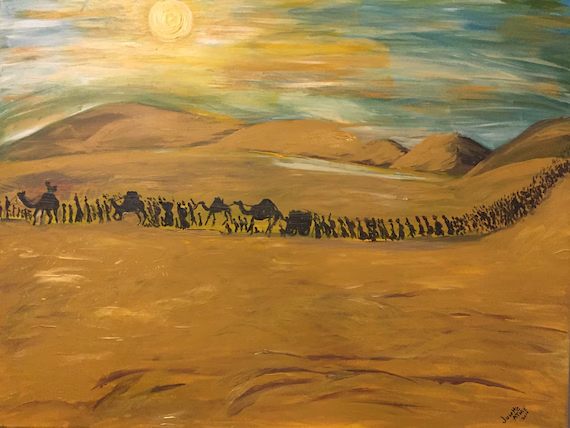On the Road to Emmaus
On that Sunday evening. Cleopas and Simon, both friends of Jesus, were walking along the road from Jerusalem to the village of Emmaus.
As they walked slowly and sadly, they talked about Jesus. After a while, a man caught up with them. It was Jesus, but they didn't recognize him and thought he was a stranger.
'Why are you, so sad, Jesus asked them. 'Are you the only stranger in all of Jerusalem who doesn't know what has happened there over the last three days? Asked Cleopas.
'Why, what has happened? Asked Jesus.
'We were talking about Jesus of Nazareth, said Simon. 'He was a great teacher. We believed he was sent by God to save our people, but the Chief Priests and the Roman rulers accused him of breaking the laws of God and of the Romans.
They condemned him to death, nailed him to a cross, and now he's dead. That was last Friday, three days ago. When some women went to his tomb today, they found that his body had gone. They said that an angel had told them that Jesus was alive.
Jesus told them that the ancient prophets had foretold that all this would happen and explained it to Cleopas and Simon.
When they reached Emmaus, it was late in the evening. Cleopas and Simon thought that the stranger was going to walk on, so they invited him to stay and have supper with them.
When they sat down to eat, the stranger picked up a loaf of bread. He broke it into pieces, said a prayer of thanks to God, and gave it to the two men. At that moment.
Cleopas and Simon realized that the stranger was, in fact. Jesus. They stared at him in silence, and then he was gone.
Very excited, they talked about Jesus for a few minutes, and then decided they must go back to Jerusalem. Jumping up from the table, they ran all the way back to the city.
Cleopas and Simon soon found some of the disciples and some other friends of Jesus. They told them that Jesus was alive, that they had seen him and spoken to him.
At first, the disciples didn't believe them, but one said; It must be true. Peter has seen him too.
They locked the door of the room because they were afraid of the Roman rulers and the Chief Priests. Then, suddenly, Jesus was in the room with them. 'Peace be with you, he said.
At first, they were very frightened; they thought he was a ghost.
'Don't be afraid, said Jesus. Look at the wounds on my hands and feet. Touch me and find out that I'm made of flesh and bone.
Then they knew that he really was Jesus.
'Have you anything to eat? Jesus asked them. They gave him some cooked fish and some honeycomb, and watched him eat it.
Jesus explained to them that this was all part of God's plan, and that it had been foretold by the prophets.
'God's Son had to die and to come alive again on the third day, he said.
'God forgives everyone who believes in me. His Son.
This is the message for all the people in the world, and you must go and tell them this.










Comments
Post a Comment